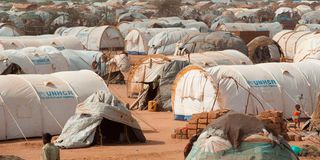Malnutrition crisis at Dagahaley refugee camp: MSF

A photo showing section of Dagahaley in Kenya's Dadaab refugee complex.
Hospital admission for children suffering from severe malnutrition has spiked in Dagahaley, one of three refugee camps in the Dadaab refugee complex, Médecins Sans Frontières (MSF) says.
According to MSF, the camp is bordering on crisis due to overcrowding, increased disease outbreaks, hospital admissions, dwindling funding and rise in urgent humanitarian needs.
MSF, operating a 92-bed hospital and two health posts in Dagahaley, says it witnessed, a surge in number of patients, especially in the paediatric ward and the inpatient Therapeutic Feeding Centre (ITFC), in 2022 representing 33 percent annual increase majority of whom were children.
According to MSF data, the percentage of Global Acute Malnutrition (GAM) among children in the Dagahaley camp has been steadily rising and reached eight percent during screening in December 2022, which is consistent with the alarming increase in child admissions.
Also read:
When compared to the prior screening in July 2022, this is a 45 percent increase.
The Horn of Africa is expected to see its sixth consecutive failed rainy season from March to May 2023, according to the United Nations Office for the Coordination of Humanitarian Affairs.
This will worsen the extent and severity of the humanitarian disaster and humanitarian actors worry that anticipated funding reductions for refugees, will force them to scale back operations further when demands are intensifying quickly.
To try and handle the situation, MSF, in coordination with the host community and humanitarian actors have built 50 latrines, put in place two water tanks and distributed plastic sheeting and floor mats for some 800 newly arrived families residing on the outskirts of the camp.
Despite MSF’s efforts to target the most vulnerable refugees living on the fringes of Dagahaley camp, the humanitarian crisis in Dadaab urgently requires wide-scale response to avert further deterioration.
MSF has now appealed to donors to quickly disperse funds, which is essential to addressing the high requirements for protection and life-saving assistance.





